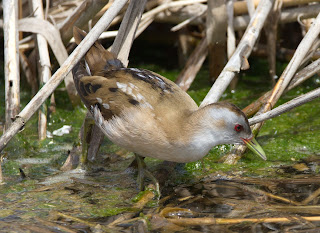Third crake post in a row but to get the most of this remarkably crake-rich season I returned to Besor yet again. Three or four each of Little and Spotted Crakes but no Baillon's in the original site. After an hour or so I gave up and walked back along the reservoir bank to a pool where I'd seen one Little and one Spotted Crake earlier. On the way I spooked another Spotted into the patch. A few minutes of waiting quietly paid off and the birds started coming out to feed. A really pretty female Little Crake had its territory staked out adjacent to the bank with a couple of Spotteds a bit further out in the shallow pools. Between them was a Baillon's Crake. The group dynamic appeared to be that the Little Crake aggressively saw off the Baillon's whenever it encroached on her territory. The chase brought them both into the Spotteds territory whereupon both smaller crakes were seen off by the larger species. The board was reset and quiet feeding followed until the Little Crake had had enough of the Baillon's once more.
Baillon's Crake
Female Little Crake - gorgeous and feisty!
Spotted Crakes
On the way to the crake-fest a nice Ruppell's Warbler showed itself and a/the Collared Flycatcher called but remained hidden. A couple of Great Spotted Cuckoos were looking a bit bedraggled in the morning dew.
While waiting for the crakes this Clamorous Reed Warbler put on a great show.
Lots of Sedge and Reed Warblers too (this one checking for spiders to eat).
This Bluethroat was attracted to the 'tchick' of my camera. Approached very close indeed.
Little Grebe trying not to be seen.
Female Namaqua Dove in the usual place.
Red-throated Pipits getting redder.
Finally, a Turtle Dove. Such beautiful plumage but a grim reminder, for me, of the annual massacre of migratory birds all around the Mediterranean basin....


















































No comments:
Post a Comment